What Is A Healthy Alternative To Sugar?
We may earn money or products from the companies mentioned in this post.
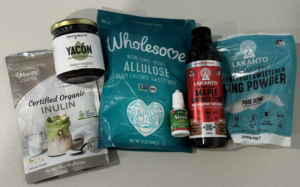 I’m going to start by leveling with you: sugar is a staple in almost everyone’s diet, but it’s also becoming a significant health concern. The problem isn’t just about cavities or a temporary energy crash. It’s deeper, affecting everything from obesity to heart disease. This isn’t just about cutting back either; it’s about smart substitutions.
I’m going to start by leveling with you: sugar is a staple in almost everyone’s diet, but it’s also becoming a significant health concern. The problem isn’t just about cavities or a temporary energy crash. It’s deeper, affecting everything from obesity to heart disease. This isn’t just about cutting back either; it’s about smart substitutions.
You see, not all sugars are created equal. On one hand, you have simple sugars, those quick bursts of energy that send your blood sugar levels on a rollercoaster ride. Then there are complex sugars, which your body breaks down slower, offering a more sustained energy release. The key difference here is how these sugars impact your overall health and metabolism.
That’s where the concept of sugar alternatives comes into play. These aren’t your average sweeteners; I’m talking about options that offer the same sweetness without the dental and health drawbacks. This approach is about longevity and maintaining good health without sacrificing the pleasures of a sweet taste.
Choosing the right sugar alternative matters. I’m going to guide you through some of the top contenders, explain their health benefits, and delve into why these alternatives might just be the change your diet needs. Trust me, it’s a game-changer. And that perfectly segues into Allulose and Inulin, two intriguing alternatives I think you should know about. Let’s explore them in more detail in the next section, shall we?
Nature’s Sweetness: Exploring Allulose and Inulin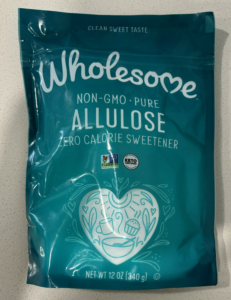
Now that you’re aware of the concerns related to sugar, let’s uncover some healthful swaps starting with Allulose and Inulin. These aren’t your typical sweeteners, and here’s why: they provide the sweetness you crave without the unfavorable health effects of regular sugar.
Allulose is an intriguing alternative you might not have heard much about. It’s a naturally occurring sugar that you can find in small amounts in certain fruits. What sets it apart is its very low-calorie content – nearly zero! This makes Allulose an awesome choice for anyone looking to reduce their calorie intake without sacrificing taste.
Concerning health benefits, Allulose doesn’t disappoint. Unlike traditional sugar, Allulose doesn’t cause a spike in blood glucose levels, making it a mindful pick for those managing diabetes. Plus, recent studies suggest it could even help control 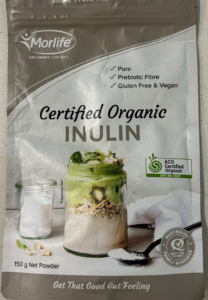 weight by reducing fat storage.
weight by reducing fat storage.
Switching gears to Inulin, this isn’t just a sweetening agent; it’s a form of dietary fiber. Extracted mostly from chicory root, Inulin has a subtly sweet taste and boasts impressive credentials for gut well-being. It plays a pivotal role in maintaining a healthy digestive system by promoting the growth of beneficial bacteria.
Moreover, Inulin functions as a prebiotic, meaning it feeds those friendly gut microbes. This not only improves digestion but could also enhance calcium absorption. And since it’s a fiber, it adds bulk to your diet, which can lead to a natural reduction in overall calorie consumption.
I’m telling you, switching to Allulose and Inulin might just be the change you’re looking for to strike a balance between health and sweetness. And the best part? These alternatives are naturally derived – a win for those seeking wholesome choices!
Exotic Sweeteners: The Power of Monk Fruit and Erythritol
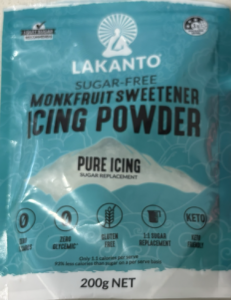 Now, let’s venture into the realm of Monk Fruit, an ancient Chinese fruit that’s gaining traction in the health community. The unique property of Monk Fruit is its intense sweetness, which, believe it or not, comes with zero calories. This isn’t just about cutting calories; it’s also about choosing a sweeter that doesn’t spike your blood sugar levels the way traditional sugar does.
Now, let’s venture into the realm of Monk Fruit, an ancient Chinese fruit that’s gaining traction in the health community. The unique property of Monk Fruit is its intense sweetness, which, believe it or not, comes with zero calories. This isn’t just about cutting calories; it’s also about choosing a sweeter that doesn’t spike your blood sugar levels the way traditional sugar does.
What sets Monk Fruit apart is mogroside, the natural compound responsible for its sweetness. You’re going to find out about how mogroside doesn’t just sweeten your foods and beverages; it also brings antioxidants to the table. This is why many health professionals advocate for Monk Fruit as a better option for those managing diabetes or trying to maintain a healthy weight.
Moving on to Erythritol, another sugar substitute that’s been on the rise. Erythritol falls into a category known as sugar alcohols, which might sound somewhat  counterintuitive since it’s neither alcohol nor sugar in the traditional sense. It has a low-calorie profile and doesn’t impact blood sugar levels significantly, making it an attractive option for those on a ketogenic diet or anyone cutting down on sugar for health reasons.
counterintuitive since it’s neither alcohol nor sugar in the traditional sense. It has a low-calorie profile and doesn’t impact blood sugar levels significantly, making it an attractive option for those on a ketogenic diet or anyone cutting down on sugar for health reasons.
The metabolic benefits of Erythritol are notable. It’s absorbed into the bloodstream before it reaches the colon, which tends to reduce the likelihood of digestive discomfort that some other sugar alcohols can cause. Plus, because it’s excreted unchanged in urine, it doesn’t provide the calories that are associated with sugar, and you don’t have to worry too much about it affecting your calorie budget. It’s always great to have options that are kinder to your metabolism. I usually use Lakanto brand which is a combination of both monk fruit and erythritol.
So, these exotic sweeteners aren’t just sideshows in the world of nutrition; they’re serious contenders for your pantry shelf. By understanding the benefits of Monk Fruit and Erythritol, you can make better decisions for your health WITHOUT SACRIFICING the sweet pleasures of life. And that’s part of the strategy I like to leverage.
Steering Towards Stevia: A Sweet Leap Forward
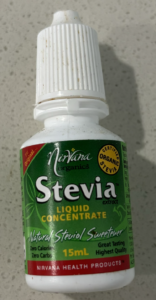 Now, if you’re aiming for an alternative that’s been trusted for centuries, let’s talk about Stevia. Extracted from the leaves of the Stevia rebaudiana plant, this sweetener has been used traditionally by indigenous populations in South America for its potent sweetness and medicinal properties.
Now, if you’re aiming for an alternative that’s been trusted for centuries, let’s talk about Stevia. Extracted from the leaves of the Stevia rebaudiana plant, this sweetener has been used traditionally by indigenous populations in South America for its potent sweetness and medicinal properties.
One major pull towards Stevia is that it boasts a zero glycemic index, which means it doesn’t spike your blood sugar levels – a massive win for anyone monitoring their glucose intake. Additionally, since it contains no calories, it’s ideal for weight management. When you’re comparing it, calorie for calorie, to refined sugar, it’s not hard to see why Stevia takes the cake.
There’s more. Unlike sugar, Stevia contributes to improved dental health by not encouraging tooth decay, and some studies hint that it might have other health benefits like lowering blood pressure. Clearly, it’s not just about cutting calories; it’s about making a conscious choice for a healthier lifestyle.
I really hope that you see why swapping out sugar for these alternatives can make such a difference. Each one – Allulose, Inulin, Monk Fruit, Erythritol, and Stevia – has unique benefits that go beyond just reducing your sugar intake. There is also “Yacon Syrup” that I use in a couple of recipes, but it is more expensive as an option. It is made by extracting the root of the Yacon Plant which grows in the Andes in South America. It tastes sweet and resembles molasses in colour. I’ve found it in a few health food stores, but it’s another really healthy alternative to sugar.
So overall, whether you’re watching your waistline, managing a health condition, or just trying to live a healthier life, these natural sweeteners can be a significant part of your strategy. Remember, your first attempt doesn’t need to be your last. Choose something that resonates with you, and you can always adjust your approach down the road. Thanks for reading, and here’s to your healthful journey forward!
